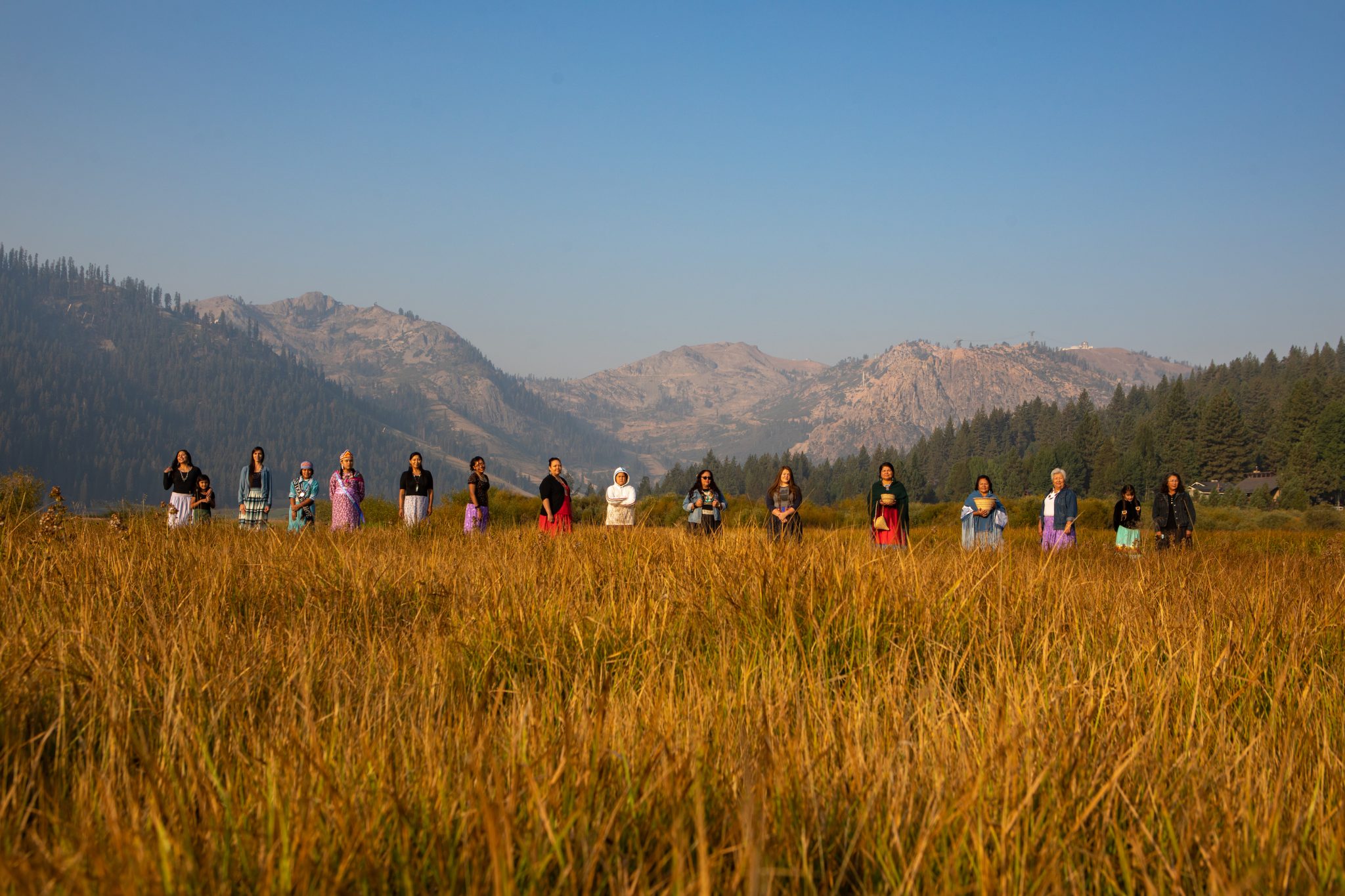
24 Sep A Ski Resort Confronts its Name
More than 70 years after opening, Squaw Valley acknowledges the racial slur in its name and reckons with the history of the Washoe
On May 25 in Minneapolis, a white police officer knelt on the neck of George Floyd, a black man, for 8 minutes and 46 seconds, cutting off his breath and killing him. In the wake of the death, protests rose up across the country with calls to bring justice for Floyd, defund or abolish the police, and reckon with the structural and systemic racism that plagues the United States. The reckoning continued to spread throughout the summer. People marched for Breonna Taylor, killed by police officers in her Louisville apartment, and Ahmaud Arbery, gunned to death while jogging in a small Georgia town, and called out the names and symbols that represent white supremacy. A football team in Washington, D.C., announced it would change its name. A household syrup company that glorified slavery announced a rebrand. And officials at Squaw Valley Alpine Meadows ski resort announced that they would invite Native American leaders to discuss the company’s name, which contains a racist slur.
Alex Cushing opened Squaw Valley on November 23, 1949, with a double chair and two rope tows. For more than 70 years, the resort had the word in its name. “Squaw,” as defined by Merriam-Webster, is “now usually offensive: an American Indian woman.” The word is outright an “ethnic and sexual slur,” according to Wikipedia, and contemporary use is “offensive, derogatory, misogynist and racist.” Members of the Washoe Tribe compare the slur to the “c-word” and say it was used by Euro-American colonizers to enforce the violent dispossession of their lands.
How did such a world-renowned ski resort hold a name that is so deeply offensive to a group of people for so long?
This wasn’t the first time Squaw Valley had been confronted over its name. Squaw Valley Alpine Meadows President and Chief Operating Officer Ron Cohen found press coverage on the topic from 1997, after Minnesota passed a law that ordered counties to rename any geographic place that contained the word “squaw.” The Washoe Tribe had also asked the ski resort to change its name in the 1990s. There has long been a “low-level understanding of the issue in the company,” Cohen says.
But something about this moment was different—the pandemic revealing persistent and vast social inequities that often fall on lines of race, or the Black Lives Matter protests that had finally reached the outdoor industry and ski towns across the rural West. The ski resort also had new leadership. In 2018, Cohen came to Squaw Valley from Mammoth with 16 years of experience in the ski industry. So in early June, when a reporter from the Sacramento Bee called the resort to ask for comment about its name, Cohen said the ski area answered honestly: It was considering a change.
“We have a name that this whole group of people is actively working to change throughout the country. They have a reason,” Cohen said in a July phone interview. “Of course, we’re going to have that discussion. We’re already having it.”
Then, in late August, after months of research, conversations with leaders of the Washoe Tribe and deliberation, Cohen issued an updated statement: The slur in the resort’s name would be dropped and a process would begin immediately to find a new name.
“As much as we cherish the memories we associate with our resort name, we must accept that these emotional attachments do not justify our continuing the use of a word that is widely accepted to be a racist and sexist slur,” Cohen said. “We will find a new name that reflects our core values, storied past and respect for all those who have enjoyed this land.”
‘It’s Taken So Long’
Back in June, Darrel Cruz, the Washoe Tribe’s director of historic preservation, heard about the ski resort’s announcement on the news.
“We were very ecstatic when we heard that they want to change the name,” Cruz said.
As soon as Cruz saw the broadcast, he reached out to the resort. Shortly after, Cohen followed up with Cruz. Their conversation made Cruz feel optimistic and understood. But the Washoe Tribe has made appeals to the resort before.
“We can’t demand to get them to do any of that. It’s private industry. All we can do is meet with them, and tell them why, and hopefully they understand and have a sensitive ear to these matters,” Cruz said.
In July, Helen Fillmore, off-reservation council member for the Washoe Tribe, said she was grateful that Black Lives Matter had reinvigorated a movement to advocate for the most vulnerable people in the country, including indigenous people. But the announcement that the ski resort was “considering” a change to its name felt almost boring to Fillmore.
“I’m happy that it’s finally coming, but it’s taken so long,” she said in July.
In August, after the resort said it was moving forward with the change, Fillmore said she no longer felt bored. Her exasperation and skepticism had been replaced with gratitude.
“Now, I’m very grateful for this change, and to the people who made it happen—to our Washoe community members, elders and leaders who kept pressure on these entities to drop this slur for decades, to the many indigenous scholars who documented the violent history and use of this term in this country, and to the handful of non-native residents and allies in this valley who have been willing to do the research and have the uncomfortable conversations with their neighbors and officials in order to educate them about the derogatory nature of this term,” Fillmore wrote in an email.
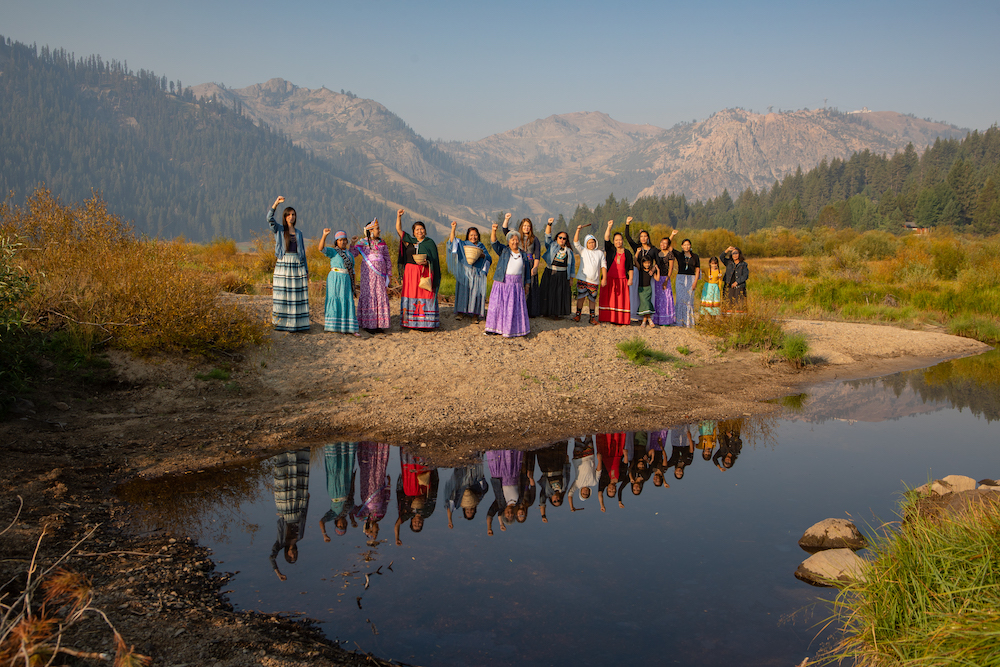
Women from the Washoe Tribe hold their fists high in solidarity on their former land in the Olympic Valley, photo by Ryan Salm
Gaining an Understanding
After the interview with the Sacramento Bee in June, Cohen dove deep into research and conversations about the name of the ski resort he runs. Daily operations of the business were focused on adjusting to the COVID-19 pandemic, but a “smaller group” was working on the name change issue actively.
“We’re trying to give it the time and effort that it deserves,” Cohen said at the time.
He spoke with representatives from the Washoe Tribe and the American Indian Movement, as well as the resort’s stakeholders, including local residents.
At the same time, he leaned on his academic background (he calls himself a “recovered lawyer”) to research the etymology of the word and its historical context, reading academic papers, studies and first-person accounts.
Etymology traces the word “squaw” to the 1630s, with many sources pointing to the Algonquian word for women that North America’s first colonizers picked up on the East Coast. For hundreds of years, the word was used by white settlers to demean Native American women. Some argue that native language speakers should reclaim the word and reject its derogatory meaning. But this narrative is dismissed by many native people who say these references are racist.
Suzan Harjo, an advocate for Native American rights, famously denounced the word “squaw” on the Oprah Winfrey Show in 1992. “Stop calling us names,” Harjo said. “We are the invisible population and discrimination against us is invisible.”
In his research, Cohen looked at the context of the word, at the timeline of when the valley was named and the simultaneous violence against indigenous people in the Sierra Nevada in the 1850s. Having a racist and sexist slur in the name hurts the business, too, he said. There have been times when the matter has come up in conversations with other businesses that wanted to visit or engage in a partnership with the ski resort but backed out. Sometimes they would tell Cohen it’s the name, and sometimes they wouldn’t give a specific reason. But Cohen said he thinks this happens more than he knows.
“I think [our name] has the potential to stop people before they ever start with us,” he said.
As a leader of a ski resort, Cohen sees part of his job as conveying this research to people who care about this place today. As such, presenting facts that contradict a narrative people have believed for more than 150 years is bound to stir up ugly sentiments.
Cohen received one email from a longtime guest and property owner in the area who copied and pasted the definition of the word from the dictionary but deleted the part where it said it was offensive. Then the person wrote an angry stream of words threatening to sell the family’s home and cash in their passes and never come to the ski resort again.
“You can disagree. You can say it’s a step too far. You can say it’s offensive,” Cohen said. “But you can’t actually delete this stuff from the definition to prove your point.”
The pandemic presented its own challenge. Cohen would have preferred hosting a town hall in person, but instead he gave his presentation in a virtual webinar in mid-July for local residents to discuss the name change.
Katy Hover-Smoot, a local resident who sits on the board for the Squaw Valley Public Service District (which, after a board vote in August, is now the Olympic Valley Public Service District), watched the presentation on her computer and said it was comprehensive and built the case for why the ski resort should change its name.
“It was an honest effort to get to the bottom of the use of the term, and it was an overwhelming condemnation, too,” Hover-Smoot said.
Cohen didn’t offer any name alternatives in the meeting.
“I’m impressed, in particular, at Ron’s willingness to host this conversation,” Hover-Smoot said.
Among residents in the valley, opinion on the change was split. About half seemed open to it and welcoming of the update. Others were resistant to the move.
On the app NextDoor, a thread started in response to the resort’s announcement that it was considering a name change. A vast majority of comments were vehemently opposed to the idea, dismissing it as nothing more than an attempt to be “PC” and insisting that there is no reason to change. One person posted a new hashtag: “Keep Squaw Squaw.” There were debates about the origins of the word and its meaning today.
Supporters of the name-change, however, said they have no attachment to the name, and that they support Native American people who want the resort to change it.
Professional skier Cody Townsend, who grew up skiing at the resort, said that among his community—a younger demographic that includes lifelong skiers in Tahoe and many professional athletes—support for the name change seems nearly unanimous.
“The word ‘squaw’ to me really has no deeper meaning other than it is what I call my favorite ski area on the planet. To me, there’s no necessary connection to the word,” Townsend said. “I would call it Blue Mountain and it still has the same identity to me, because what’s important to me are the chairlifts and the terrain on the mountain, not necessarily what I call it.”
Michelle Parker, another professional skier who grew up skiing at the resort, agrees.
“I am in zero way attached to that name,” Parker said. “It was pretty black-and-white for me. If the Native American community was speaking up about this, I would side with them, 100 percent, without question.”

Photo by Matt Palmer, courtesy Squaw Valley Alpine Meadows
Washoe Country
Members of the Washoe Tribe are clear and concise about how they have felt about the term “squaw” being used to name a place in their homeland.
“It doesn’t settle with us,” Cruz said. “I can tell you that all Washoe have an attachment to all of their lands. We view it as all of our lands. We never did cede the land over. It was taken from us.”
In 2009, the Washoe Tribe published a booklet, Wa She Shu: The Washoe People Past and Present, that briefly outlines the tribe’s vast history. It opens: “People that live or travel within Washoe ancestral territory know little to nothing about the past and present of the people and the land.” Today, some 20 million people come to Lake Tahoe, the heart of Washoe lands, every year.
Before contact with white settlers, all three bands of Washoe—Wel mel ti in the north, Pau wa lu in the east and Hung a lel ti in the south—gathered at Tahoe, or Da ow, for a summer celebration. Then they would head to surrounding valleys to hunt and fish or harvest plants that were blooming. Olympic Valley, where the ski area is located, was one of the places the tribe visited during the warmer months.
While some indigenous people belong to nations, the Washoe are a tribe. Today, the tribe numbers about 1,500. The Washoe have always been comparatively smaller than other tribes and nations, and the geography of their ancestral land—the Great Basin to the east and the Sierra Nevada crest to the west, with Lake Tahoe at the center—kept them protected from Euro-American colonizers for centuries.
As Matthew S. Makley points out in his book about Washoe history, The Small Shall Be Strong, the tribe’s isolation enabled them to preserve their way of life longer than some of their neighbors. The mountains protected the Washoe from the impacts of early colonization, but they weren’t immune to the systemic and rampant violence following the discovery of gold in California and then silver in the Washoe’s easternmost ancestral lands.
In The Small Shall Be Strong, Makley documents the first encounter between settlers and the Washoe in May 1827, when a fur trapper named Jedediah Smith and his companions were navigating through the mountains during a heavy late-season snowstorm. When Smith came across two Washoe women, he described their reaction in his journal as a “frantic mother rushing to scare away some beast that would devour her child.”
Almost 20 years later, in 1844, John C. Fremont and Kit Carson passed through Washoe lands on a surveying expedition. Fremont’s party was attempting to cross what would become known as Carson Pass in the height of winter. Members of the Washoe Tribe warned the men, suggesting they follow the Truckee River to Donner Lake and over Donner Summit. They also provided a guide. Despite their advice and warnings, Fremont stubbornly pressed on, and one morning he woke to find the Washoe guide had left his group.
“Although his journals heretofore recorded only acts of hospitality from the Washoes and Paiutes,” Makley writes, “[Fremont] now adjudged Mélo’s [the guide] actions as treacherous and ‘in perfect keeping’ with his estimate of ‘Indian character.’”
Makley also records James Nye, the first territorial governor of Nevada, describing the Washoe as “miserable people” who were “but one remove from the brutes.” Racial characterizations formed an important part of American colonization, Makley writes. “The stereotype helped to justify Indian dispossession and mistreatment.”
In 1859—just three decades after the encounter with Smith—the Comstock Lode of silver was discovered in the heart of the region where the Washoe harvested pine nuts. Some 20,000 miners followed. The Washoe could no longer stay hidden.
“The forests and valleys that had belonged to the Washoes now became hinterlands and sources of raw materials to support the growth of the greatest ore discovery the world had known,” Makley writes. “Virginia City became the quintessential western boomtown. For Washoes who had encountered Fremont only twenty years before, it must have been as if the world had been turned upside down.”
The California genocide was a statewide campaign that murdered thousands of Native Americans in the mid-1800s, the same period when settlers named a beautiful rock-walled valley just north of Tahoe “Squaw.” California militias, U.S. Army units, vigilante groups and individual settlers killed as many as 16,000 indigenous people in the state, according to research published by Benjamin Madley, associate professor of history at UCLA. Tens of thousands more died on reservations, in hiding or in slavery. Then came disease, which Cruz said took a massive toll on the Washoe.
Murdering wasn’t the only method settlers used to colonize the West. They also described indigenous people in a way that dehumanized them. “So they can commit crimes against us without guilt. We’re no longer people. We’re just things,” Cruz said.
These same words were often used to name landscapes where settlers had found native people. Racist slurs like “squaw” were powerful tools for the state-sanctioned genocide of indigenous people in California.
Settlers forced the term “squaw” on the Washoe, Cruz said. “Those same people were the ones killing native people in California.”
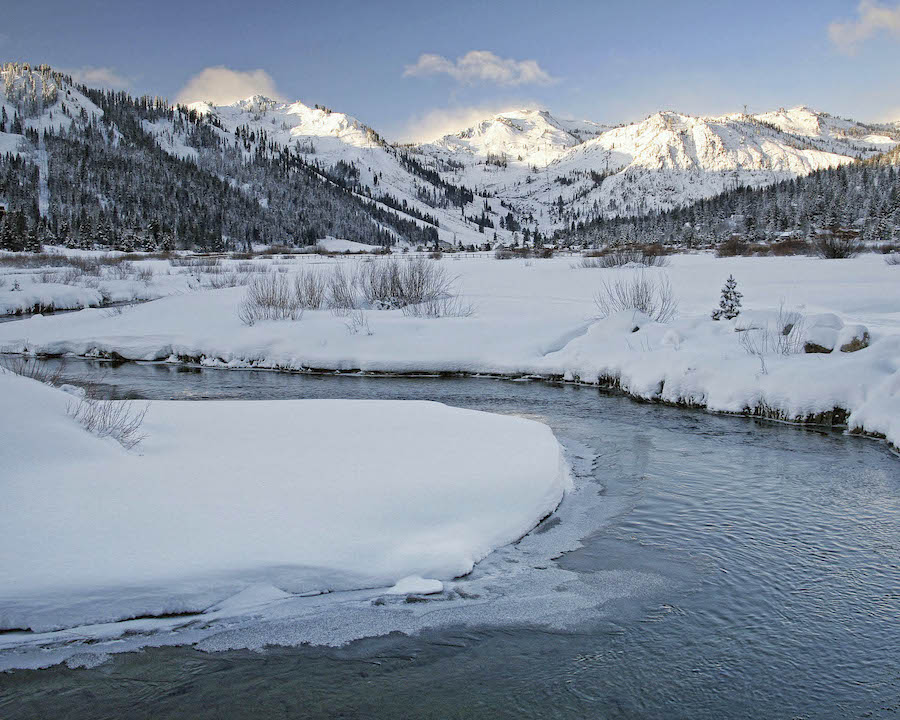
Photo by Chris Beck, courtesy Squaw Valley Alpine Meadows
Contrasting Views
Brothers Glen and Wayne Poulsen are part of a well-known local family because their father, Wayne Sr., was the visionary who purchased various properties in Squaw Valley between 1938 and 1946, including a ranch and land from the Southern Pacific Railroad. Wayne Sr. convinced Alex Cushing to go into a partnership and build a ski resort there.
The brothers’ memories of growing up in the valley are idyllic, and they both remember Native American people coming to the valley in the summer to camp in small groups near the creek. The women would weave baskets from willow leaves. Wayne said the construction of a graded road into the valley and the installation of electricity were both factors that led to more white people moving into the valley, which eventually drove the Washoe away. (However, Cruz said the Washoe own property in Olympic Valley.)
At his home in Tahoe City in mid-July, Glen opened a heavy hard-covered edition of The Saga of Lake Tahoe—a history book of the area written mostly from the perspective of white settlers—and flipped to a topographic survey map that Placer County commissioned in 1865. He pointed to Squaw Valley, listed among other geographic place names. The next page quoted Thomas Young, a surveyor who called the location “the most beautiful valley the eye of man ever beheld.” On the page, the quote is accompanied by a black-and-white picture of the Poulsens picnicking in the undeveloped valley.
“Squaw Valley was named in admiration and respect for the place and the name should be taken in that context,” Glen said.
The Poulsens look to Young’s quote as the context under which the valley was named. Young’s enthusiasm for the landscape is undeniable. However, his words don’t provide any reason or explanation about the word “squaw” in the name. Squaw Valley, Squaw Creek and Squaw Peak were named by early miners and lumber workers as early as 1857, according to California Place Names. The Poulsens agree that the names were imposed by white settlers.
In his research of indigenous people in the United States and experiences with nomadic people in Asia, Wayne Jr. said that he believes native cultures think of landscapes in terms of stories. “This is a very key point,” he said. “The beauty of one view compared to another view, what the smell was. All of these stories of the landscape tell us that this is how they navigate through their world.”
Wayne Jr. told a story about the valley: “In this range of mountains, what did they call that peak over there? It looks exactly like a beautiful woman laying on her back, looking at the sky.” He said that if people have a derogatory feeling about the word “squaw,” then that is a reflection of their own subliminal beliefs about native women. “If you associate it with beauty and the landscape, then you have very dear and comforting and beautiful feelings about it.”
This is a stark contrast with other accounts about how Squaw Valley was named.
Placer County historian Leonard Davis wrote about an “obscure article” that was published in the Iowa Hill Weekly Patriot in 1859. According to this account, in the summer of 1852 a group of settlers arrived in the valley. One man in the group, who was “wild, reckless and dissolute,” vowed to kill the first native person he encountered. In the valley, he shot a Native American woman in the head. The brazen tragedy was met with a forceful attack from the tribe. Davis writes that a group of native people (he does not mention the Washoe specifically) “swarmed down upon the wagon train” and killed the murderer. Davis writes that from this time forward, the valley was called Squaw Valley.
Today, Washoe women condemn the “s-word” and its imprint on the land where their ancestors lived for countless generations.
“It is a word that is not only a reminder of genocide and of violence against women, and specifically the violence against my family members and the women that I come from, but it’s also a term that just goes to show how invisible indigenous people are and indigenous women are in our homelands,” said Fillmore. “It is said and used without any second thought of how it impacts the people that it’s in reference to. No second thought. People use this in all kinds of different ways in reference to the ski resort. And as someone who lives here, locally in Reno, it’s something that I hear constantly.”
Living in Reno, Fillmore sees the word on a near-daily basis because of the ski resort’s outsized presence in the region. It’s on highway signs. It’s referenced in the names of other businesses affiliated with the resort. It’s the name of a road, a park, and mentioned in countless references to the ski and outdoors culture in Tahoe. Every time Fillmore hears the slur, she said she has a reaction that hits her entire body and makes her feel horrible.
“All women can relate to the impacts of what cat-calling can do to us emotionally, what constantly hearing negative words in reference to women and how that leads to how we feel comfortable walking down the street, or how uncomfortable we would feel walking on the street, existing in our daily lives. This is that full-on level for indigenous women. It takes it a step further because it is a constant reminder of so many different things,” Fillmore said.
Violence against native women is an epidemic that continues today. One in three native women will be raped in their lifetimes, reports Amy Casselman Hontalas, a doctoral student at Stanford, in her book, Injustice in Indian Country. The slur’s persistence crystallizes inter-generational trauma experienced by indigenous women. There isn’t a Washoe family that doesn’t have their own story about violence against themselves, or their mothers, or their aunts, Fillmore said.
“Most definitely [the word] is a reminder of how vulnerable we are to violence as indigenous women,” Fillmore said. “And how much more vulnerable we are to it compared to other women.”
Fillmore is one of the few speakers of the Washoe language, which she describes as unique and isolated, and not related to any other indigenous language in the area. “Our word for women is damumóˑʔmoʔ,” Fillmore said.
A few years ago, Fillmore joined a group for Washoe women and mothers of Washoe children to share traditional skills and stories, as well as events and announcements. “We couldn’t stop laughing,” she said. The group calls themselves Damumomo ’Asawi, a name that was given by one of the tribe’s language teachers, Bernadine James. It translates to “the women are laughing.”
“Because that’s what it was like when we were together—women sharing stories and laughing. It’s healing,” Fillmore said. “The biggest smiles, the comfort that you feel with your aunties, your grandmothers, your sisters, your cousins.”
Renaming the ski resort is long overdue, Fillmore said. She doesn’t want the resort to be named in reference to Washoe women at all.
“I know that my nieces are not going to have to grow up with the same experience that I grew up with,” she said. “Future generations don’t have to experience that. And that, in so many ways, is the biggest win ever.”
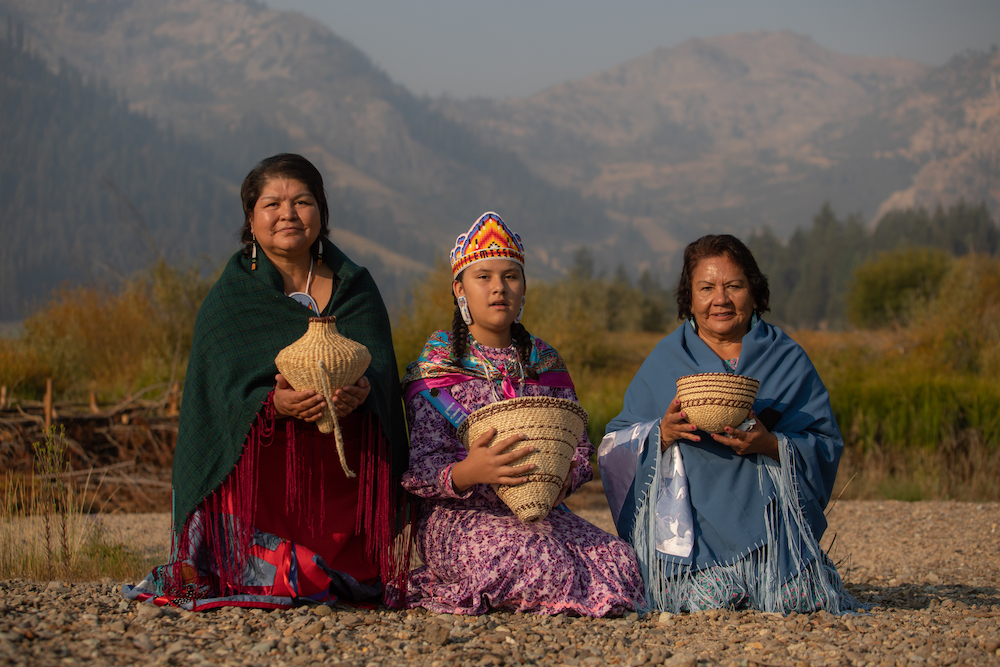
Women of the Washoe Indian tribe gather in celebration of the upcoming Squaw Valley name change
What’s Next?
Now that the ski resort has decided to change its name, a much larger process awaits that Cohen said “will cost a lot of money.” He didn’t provide a specific amount, but it’s safe to assume it could cost millions to undergo a rebranding effort that large. In the official statement, the resort said a new name will be chosen in 2021, and that implementation of that name—likely an overhaul of everything that displayed the old name—will take place after the ski season ends in the spring.
Cruz feels relieved. He said that just being able to drive on the roads into Tahoe without seeing the word on signs will make a huge difference and help heal old wounds. In a statement, the Washoe Tribal Council said it “recognizes the significance of the name change and on behalf of the Washoe people expresses its great appreciation for this positive step forward.”
There are other places in the valley that will likely change their name, too. Dozens of other businesses are named after the ski area, as are a road, a mountain and a creek. After a unanimous board vote, the Squaw Valley Public Service District is now the Olympic Valley Public Service District.
Placer County Supervisor Cindy Gustafson said that she would follow the ski resort’s lead on any changes to the road and the park at the mouth of the valley. Tahoe National Forest Service Supervisor Eli Ilano said that he is following the resort’s process, too. Since 2012, the Forest Service in California’s Region V has recognized “squaw” as a derogatory slur and supported changing the names of places that used it. Ilano said the Forest Service won’t typically initiate a change to places like Squaw Peak or Squaw Creek—those proposals must be submitted by the public.
Choosing a new name will be its own huge step—and Cohen said this part must be done carefully and holistically.
“This place, the people who love this place, the history that’s been made here—all of those things absolutely deserve a maximum of respect in choosing a new name. You can’t do that overnight,” Cohen said.
Many people think Olympic Valley is the obvious choice, since that’s what the postal service named the zip code during the 1960 Olympic Games. But the International Olympic Committee holds the word “Olympic” tightly with trademarks. Cohen wouldn’t comment on legal issues, except to say that while the Olympics are an important chapter, they are not the sum total of the ski resort’s history.
After the resort changes its name, what might come after? Doing the research, having these conversations, moving the conversation forward and choosing a new name, rebranding—all of that is significant. But is that where it ends? Cruz said he’s hoping to have more conversations in the future about giving Washoe people more access to the land where the ski resort is located.
Cohen said the work is never done.
“We, as a human people, are never going to sit back and go, ‘Everything’s good!’ That’s never happened and it never will because we always strive to do better,” he said. “The next steps are to just keep going and to try to continue to be good citizens. We’re committed to doing that.”
Editor’s note: This article was updated from its original version to reflect an account written in the Iowa Hill Weekly Patriot about how Squaw Valley was named.
Julie Brown is a freelance journalist based in Reno and Lake Tahoe. So long as the lifts are able to open in a pandemic, this winter she’ll be skiing [???] Valley Alpine Meadows.



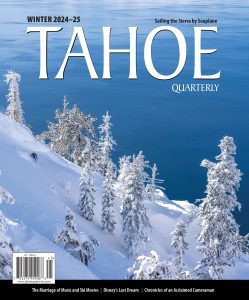
William Washburn
Posted at 21:45h, 10 SeptemberWell written and researched. Thank you for a thoughtful and thought-provoking piece.
Chris
Posted at 20:54h, 12 SeptemberHi Julie! You wrote “Forest Service won’t typically initiate a change to places like Squaw Peak or Squaw Creek—those proposals must be submitted by the public.”
Do you know if this process has been initiated? If not, I’d like to help. Please advise – I’d like to contribute to this kind of progress if a public contribution is useful.
GS
Posted at 11:32h, 24 SeptemberYou also need to update the facts on the deaths of black people in your opening. Your accounts have been disproven with factual reports yet your use the BS media lines and lies spread by individuals wanting to cause more issue and division. If you want people to read your entire article don’t start with lies and made up story lines, do and use factual research.
NORMAN VADNAIS
Posted at 00:07h, 31 DecemberI believe she used the facts correctly. Court cases have confirmed her statements in 2 of the 3 scenarios, while the facts of the third align with the statements (without implication of responsibility or guilt). This is a well written and thought provoking piece.